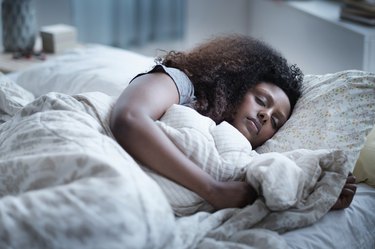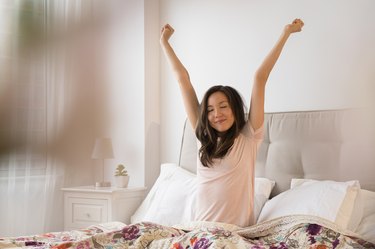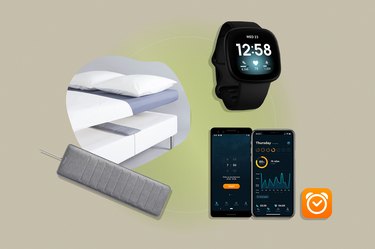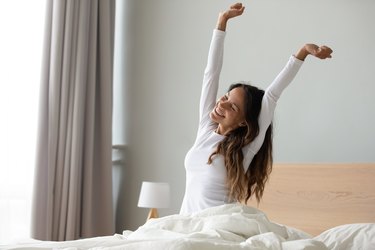
Maybe you've had a rough day and are looking forward to cozying up in bed. As you blissfully doze off, though, you're suddenly woken up by a sensation of your arms and legs jerking. You're awake again and, in your sleepy haze, wondering what just happened.
"This is called a hypnic jerk, or a sleep start," Raj Dasgupta, MD, an assistant professor of clinical medicine at Keck Medicine of USC in Los Angeles, California, tells LIVESTRONG.com. "As you're falling asleep, you get this feeling like a jolt of electricity."
Video of the Day
Video of the Day
It's not a seizure, and it's a totally benign occurrence. And it's common, too — up to 70 percent of people experience hypnic jerks (which are sometimes called hypnagogic jerks). You might also get the impression that you're falling as you have them.
While they're nothing to worry about, they can serve as a clue that something's off with your lifestyle or that you could use a little self-care. Here's what might be going on:
1. You’re Sleep-Deprived
When it comes to hypnic jerks, sleep deprivation is the most common cause, Dr. Dasgupta says. "This might be that you're not getting a good quantity or quality of sleep," he explains.
Poor quality sleep means you're not getting enough slow-wave or REM sleep, which are the restorative stages of sleep. How can you tell? Despite being in bed — seemingly sleeping — for the seven to nine hours recommended by the National Sleep Foundation, you might wake up feeling unrefreshed and be sleepy during the day.
To address sleep deprivation, make sure you're giving yourself enough time in bed in order to get the minimum seven hours — set a "go-to-bed" timer if it helps to remind you. Sleep hygiene, such as having time before bed for relaxing activities and staying away from screens (yes, that includes scrolling on your phone), is also important for sleep quality, Dr. Dasgupta says.
2. You’re Stressed
Mental and emotional stress can also trigger a sleep start.
"It would be very interesting to know if people started experiencing more hypnic jerks during the pandemic," Dr. Dasgupta says.
This plays perfectly into the idea that you could use some relaxation or wind-down time before bed to ease any anxieties that might be keeping you awake and physically relax so you can fall asleep peacefully.
3. You’re Over-Caffeinated
Stimulants, such as caffeine and nicotine, are also associated with hypnic jerks, Dr. Dasgupta says. And it's no surprise that sleep deprivation and caffeine consumption can go hand in hand.
The more sleep-deprived you get, the more you might rely on caffeine to keep you awake, and you may drink it later in the day (disrupting your sleep even more). The U.S. Food & Drug Administration recommends people consume no more than 400 mg of caffeine daily, or four to five cups of coffee (we're talking about 8-ounce home-brewed cups, for the record).
4. You Have Sleep Apnea
Because hypnic jerks happen during the transition between wake and sleep, they may be more likely to occur if you have sleep apnea, a condition marked by brief pauses in breathing throughout the night, which causes multiple arousals and awakenings, Dr. Dasgupta explains.
Other signs and symptoms of apnea include snoring or gasping during sleep (something your bed partner might notice), as well as excessive daytime sleepiness or headaches when you wake up, according to the National Heart, Lung, and Blood Institute. Sleep apnea is dangerous because it can increase your risk of heart disease and type 2 diabetes, so talk to your doctor.
Sleep Starts vs. Restless Legs Syndrome
Hypnic jerks are very different from conditions like restless legs syndrome (RLS). "RLS is not a sleep disorder, but it's a disorder that prevents you from sleeping," Dr. Dasgupta explains.
Classic symptoms of RLS include uncomfortable sensations in your legs when going to bed that are usually relieved by stretching or moving your legs. RLS can affect sleep by keeping you awake — contributing to insomnia — and interfering with your ability to get into the deeper stages of sleep, leading to poorer sleep quality.
What About Twitching During Sleep?
Another type of twitching or movement you might experience is called periodic limb movement disorder (PLMD). These limb movements occur at night and usually involve the legs, Dr. Dasgupta says, adding that though they're usually not harmful, they may wake you up during the night, causing fatigue the next day.
Many people who have PLMD also have other conditions such as RLS or obstructive sleep apnea. If these nighttime leg twitches are cutting into your sleep, talk to your doctor, who may want to see you to rule out underlying conditions. If you do have RLS and PLMD, there are medications that can help, as can avoiding caffeine.
- Handbook of Clinical Neurology: “Chapter 90 – Nonepileptic paroxysmal sleep disorders”
- Sleep Health: “National Sleep Foundation’s sleep time duration recommendations: methodology and results summary”
- U.S. Food & Drug Administration: “Spilling the Beans: How Much Caffeine is Too Much?”
- StatPearls: “Periodic Limb Movement Disorder”
- ScienceDirect: “Hypnic Jerk”
- Merck Manual: “Periodic Limb Movement Disorder (PLMD) and Restless Legs Syndrome (RLS)”
- National Heart, Lung, and Blood Institute: “Sleep Apnea”
Is this an emergency? If you are experiencing serious medical symptoms, please see the National Library of Medicine’s list of signs you need emergency medical attention or call 911.


